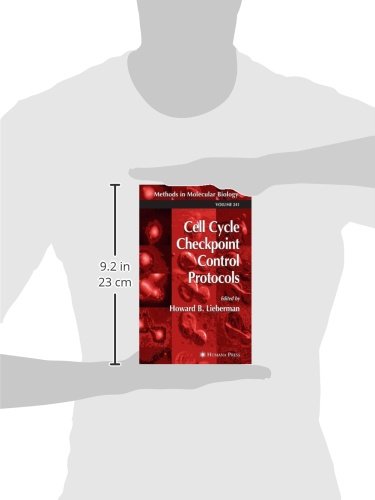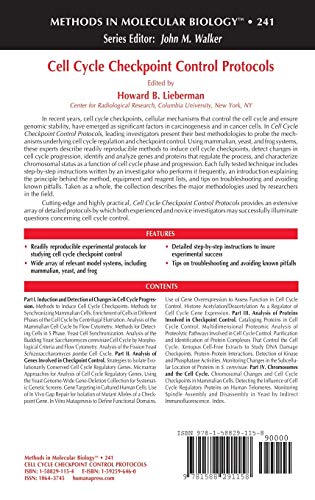Cell Cycle Checkpoint Control Protocols: 241 (Methods in Molecular Biology)
Cell Cycle Checkpoint Control Protocols: 241 (Methods in Molecular Biology) is backordered and will ship as soon as it is back in stock.
Pickup available at Delhi Warehouse
Usually ready in 24 hours
Genuine Products Guarantee
Genuine Products Guarantee
We guarantee 100% genuine products, and if proven otherwise, we will compensate you with 10 times the product's cost.
Delivery and Shipping
Delivery and Shipping
Products are generally ready for dispatch within 1 day and typically reach you in 3 to 5 days.

Cell Cycle Checkpoint Control Protocols: 241 (Methods in Molecular Biology) is backordered and will ship as soon as it is back in stock.
Author: Liberman
Brand: Humana
Edition: 2004 ed.
Binding: hardcover
Number Of Pages: 376
Release Date: 01-12-2004
model number: 9781588291158
Part Number: 9781588291158
Details: The field of cell cycle regulation is based on the observation that the life cycle of a cell progresses through several distinct phases, G1, M, S, and G2, occurring in a well-defined temporal order. Details of the mechanisms involved are rapidly emerging and appear extraordinarily complex. Furthermore, not only is the order of the phases important, but in normal eukaryotic cells one phase will not begin unless the prior phase is completed successfully. Che- point control mechanisms are essentially surveillance systems that monitor the events in each phase, and assure that the cell does not progress prematurely to the next phase. If conditions are such that the cell is not ready to progress―for example, because of incomplete DNA replication in S or DNA damage that may interfere with chromosome segregation in M―a transient delay in cell cycle progression will occur. Once the inducing event is properly handled― for example, DNA replication is no longer blocked or damaged DNA is repaired―cell cycle progression continues. Checkpoint controls have recently been the focus of intense study by investigators interested in mechanisms that regulate the cell cycle. Furthermore, the relationship between checkpoint c- trol and carcinogenesis has additionally enhanced interest in these cell cycle regulatory pathways. It is clear that cancer cells often lack these checkpoints and exhibit genomic instability as a result. Moreover, several tumor suppressor genes participate in checkpoint control, and alterations in these genes are as- ciated with genomic instability as well as the development of cancer.
EAN: 9781588291158
Package Dimensions: 9.1 x 6.2 x 1.0 inches
Languages: english









